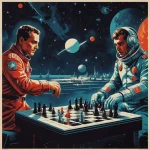-
Bits & Bytes: Computers use binary (1s and 0s). A bit is a single binary digit. Eight bits form a byte, roughly equivalent to one letter or symbol.
-
Kilobytes (KB): A kilobyte is approximately 1,000 bytes (technically 1,024 due to binary). Stores about two pages of text. 5¼” floppy disks held 360KB.
-
Megabytes (MB): A megabyte is approximately 1,000 kilobytes. Holds about five large books, one photo, or one minute of music. 3½” floppy disks held 1.4MB.
-
Gigabytes (GB): A gigabyte is approximately 1,000 megabytes. Holds about 400 books, 1,000 pictures, or 16 hours of music. 1GB hard drives were available in the mid-1990s.
-
Terabytes (TB): A terabyte is approximately 1,000 gigabytes. Holds about 400,000 books (30 school libraries), a million pictures, or two years of continuous music. 1TB hard drives are now inexpensive.
-
Recap: The video covered bits, bytes, kilobytes, megabytes, gigabytes, and terabytes, explaining their relationships and approximate storage capacities.
#chats #PowerPoint




